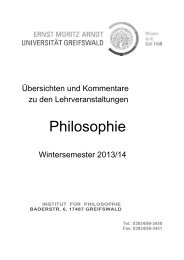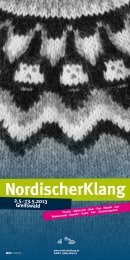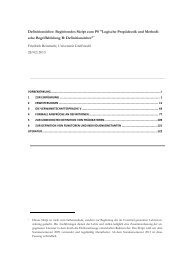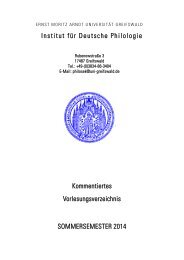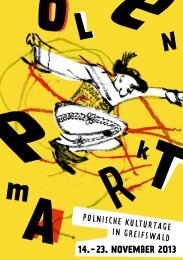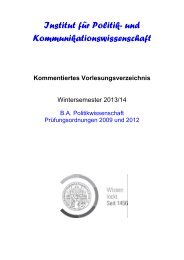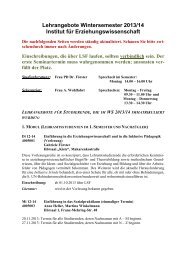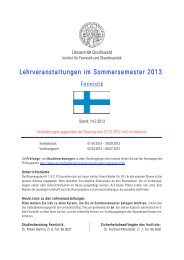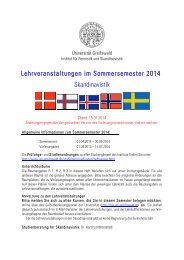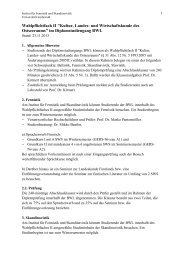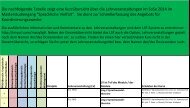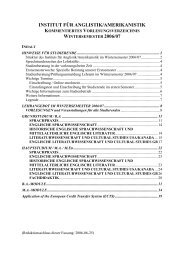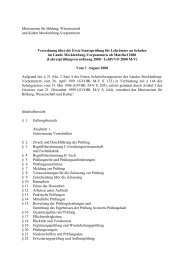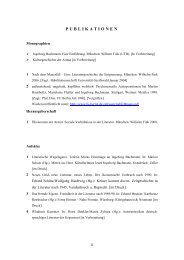ANGLISTIK/AMERIKANISTIK
ANGLISTIK/AMERIKANISTIK
ANGLISTIK/AMERIKANISTIK
Create successful ePaper yourself
Turn your PDF publications into a flip-book with our unique Google optimized e-Paper software.
Language performance across the life-span: the age factor (Hauptseminar) 4002073<br />
2 SWS ab 5. Sem. Mi 08-10 R 23 Amei Koll-Stobbe<br />
This Hauptseminar will deal with age as a sociolinguistic variable. The focus will be on<br />
changes in language and language use which occur from childhood through adolescence and<br />
mature adulthood up to advanced age. In addressing this topic, we will include findings from<br />
social psychology and sociology, pointing out the shift from a conception of age as a<br />
biologically conditioned factor to a view of age as a flexible and socially negotiable construct.<br />
Additionally, we will take into account results of sociolinguistic research that illustrate<br />
convergent and divergent features of language production of young, grown-up and elderly<br />
language speakers as well as findings from psycholinguistics and neurolinguistics,<br />
confronting notions of age as maturation with conceptions of age as decay in relation to<br />
language use and communicative competence. Finally, we will study the construction of age<br />
in public discourse, e.g. in press language and advertising. Students must be willing to give a<br />
presentation based on a self-study project.<br />
maximum participants: 30<br />
Linguistic semscapes: Written forms of communicative interactions in multicultural city<br />
spaces (Hauptseminar) 4002074<br />
2 SWS ab 5. Sem. Mi 10-12 R 23 Amei Koll-Stobbe<br />
In recent years an increasing number of sociolinguists have started to take a closer look at<br />
language around us displayed on shop windows, commercial signs, posters, official notices,<br />
graffiti and other displays of written language visible in the public sphere. In this seminar we<br />
will learn how to analyze the cityscapes of multilingual urban agglomerations, an approach<br />
that gives insights into spread, functional domains and prestige of languages in multicultural<br />
settings and relates to other fields in linguistics such as social semiotics, language policy and<br />
phenomena of language contact and change. Students are expected to embark on self-study<br />
and data-collecting projects and to give presentations in class.<br />
Textbook: Shohamy, E., Gorter, D. (eds.) Linguistic landscapes: Expanding the scenery. New<br />
York: Routledge 2009.ER 930 S559<br />
maximum participants: 30<br />
LITERATURWISSENSCHAFT UND CULTURAL STUDIES USA/KANADA<br />
Holocaust Literature (Hauptseminar) 4002077<br />
2 SWS ab 5. Sem. Mo 10-12 R 24 Hartmut Lutz<br />
After the end of the Nazi holocaust, survivors felt that there would be “no poetry after<br />
Auschwitz” (T. W. Adorno), or they considered “silence as the deepest form of respect for the<br />
Holocaust victims” (Eli Wiesel and George Steiner), but as time went on, they began to<br />
realize that they had to bear witness to the unspeakable horror they had gone through by<br />
writing down their experiences for the coming generations. Collective traumas are transgenerational.<br />
In this seminar we will read and discuss diaries and memoirs of holocaust<br />
survivors as well as fictional recreations and reflections by contemporaries and later<br />
generations. Students should obtain copies of Eli Wiesel’s Night (1960), Isaac Bashevis<br />
Singer’s Enemies, A Love Story (1972), Walter Abish’s How German Is It? (1979/80), and<br />
Eva Stachniak’s Necessary Lies (Canada, 2000). Additional short texts will be made available<br />
during the term. All participants are expected to submit 4 pp. fact sheets/book reports for our<br />
classroom discussions. Scheine will be based on term papers .<br />
maximum participants: 25<br />
22



